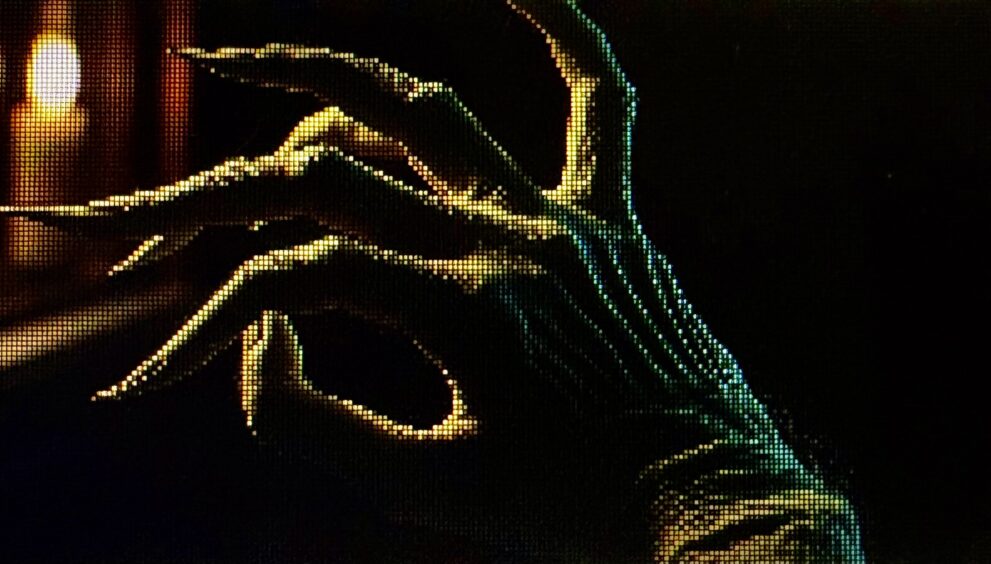by Yvonne Gurley
I recently realized that the Grinch doesn’t only appear at Christmas—he steals all year long. Yet, despite the challenges, I hold on to the hope that one day I will say, “It was all for my good.” Until that day comes, I strive to let go of what was lost along the way to pursuing my dreams. The Grinch is real, but he hasn’t stolen everything.
In the summer of 2021, my family and I took a trip to Los Angeles, California. While visiting a theme park, I became captivated by a TV network’s logo hanging above a bar. I asked my mother to snap a photo of me standing beneath it. At the time, I thought nothing more of the picture. Little did I know that image would become a symbol of a journey filled with both hope and heartbreak.
I was a non-traditional student who returned to college during the pandemic after more than a decade of working in the medical insurance industry. A series of back surgeries forced me to leave my job, and I sought something that could reignite my sense of purpose. I turned to writing—a passion that had always saved me. I published books and fell back in love with storytelling, a dream I had abandoned during the economic crash of 2008. It took years to realize I didn’t need a journalism degree or a big network behind my name to be a writer—I already was one.
Despite the challenges—the pandemic, back surgeries, and raising three children—I was determined to earn my journalism degree. I wrote papers from hospital beds, battled the effects of COVID-19, and persevered through the mental strain. My hard work led to an opportunity in 2022: a fellowship supporting people of color in the entertainment industry. That summer, I landed an internship with the very same TV network from the photo.
Because of the pandemic and my pregnancy, I interned remotely. I gave journalism everything I had. I soaked up knowledge, improved my writing skills, and soared through my last two years of college. By the summer of 2023, I returned for a second year with the network—this time, in person. I was eager and hopeful, ready to turn my internship into a permanent position.
Before relocating my family, I expressed my need for more than an internship—I needed a job. I was reassured: “I’m sure there’s something we can find for you to do.” Trusting those words, my husband and I moved our family and arranged childcare near the network’s station. However, the day before I was to start, our chosen daycare informed us they were at capacity. I scrambled to find alternatives, eventually securing a temporary solution through a drop-off care center.
When the daycare center offered free childcare in exchange for part-time work, I thought our problems were solved. But after just one week, they rescinded the offer, leaving me with no choice but to inform the network. Despite my efforts and the quality of my work, my future there quietly slipped away. I finished my internship remotely, even while living just around the corner. By the end, communication ceased, and all my fellow interns who wanted jobs received them—except me.
The disappointment was profound. I was in a new state, far from family and friends, without the job I had counted on. Yet, even in that dark time, a glimmer of hope emerged. A guest from the show I had written scripts for thanked me personally, and through that connection, I found a new job. It seemed like a blessing, but the reality was far from it.
The new job was the most traumatic work experience of my life. As the only African American employee, I faced isolation and discrimination. I felt as though I had stepped into a time machine, back to an era when people like me were unwelcome. The emotional toll became unbearable, and I eventually had to resign for the sake of my well-being.
Shortly after, a car accident left me with two herniated discs, no transportation, and mounting financial strain. The Grinch had come to steal again. I maxed out credit cards and loans just to survive. My children missed school due to our lack of a vehicle, and I couldn’t even apply for jobs without a way to get there. In a moment of desperation, I reached out to the fellowship that had once supported me. Their response was disheartening: “Given everything that’s happened, don’t you think the network made the right decision?”
I grieved. I questioned whether pursuing my dreams had been a mistake. I told myself I would never write again—and for a while, I didn’t. Fear of rejection became an ever-present shadow, turning every job interview and application into a painful reminder of past disappointments. I felt invisible, as if life itself had ghosted me.
But then, something shifted. I realized that the Grinch isn’t just a thief—he’s also a reflection of what happens when rejection steals your hope. Like the Grinch, I had become guarded and cynical, afraid to believe in the possibility of something better.
Yet, here I am, writing again. I don’t know who my “Cindy Lou” is—the person who will see my worth and give me the chance I’ve been waiting for—but I have hope. I believe that one day, the struggles I’ve faced will make sense, and I will reclaim the dreams that once felt so far out of reach. The Grinch may still lurk around, but he hasn’t taken everything. I still have my voice, and I will continue to use it.



